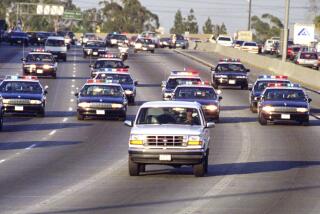Free Football Party Lures Fugitives Into Arms of Law
- Share via
WASHINGTON — For Charles Watkins, Sunday looked like a dream day. A Washington Redskins fan, he had unexpectedly snared two tickets to the team’s last home game of the regular season, a showdown with the Cincinnati Bengals that could determine playoff berths for both teams.
Watkins, along with 99 other Redskins supporters, had received an invitation from Flagship International Sports Television Inc., a self-described new Washington all-sports channel, to attend a pregame brunch and the game.
Directed by Hostess
Inside Washington Convention Center, site of the promotional brunch, a hostess in a tuxedo directed Watkins to a registration desk where his identity was verified and a name tag was pinned on his coat. He then was escorted up an escalator to the party room. There, Watkins and 17 other winners were greeted by a master of ceremonies decked out in high hat and tails.
Suddenly, the master of ceremonies interrupted his pitch for the new TV channel to let his audience in on “a big surprise.”
“You’re all under arrest,” he barked, as 25 members of the special-operations teams of the U. S. Marshals Service and the Washington Metropolitan Police rushed into the room and leveled shotguns, stun guns and other weapons at those invited to the brunch. “Put your hands on top of your heads,” ordered the emcee, whose voice had lost its cheery tone.
Watkins, an accused murderer whose name was on the District of Columbia’s list of 10 most wanted felons, had something in common with the other “winners.” All were fugitives sought for escaping jail, jumping bail, violating parole or failing to make court appearances. Their original offenses range from murder and rape to assault, robbery, burglary and narcotics law violations.
They had fallen victim to the latest sting operation concocted by the marshals--in this instance with the aid of local police--to make a dent in the number of fugitives from justice at large in America, estimated at 250,000. Flagship International was created by the marshals for a roundup of fugitives whose last known addresses were in the District of Columbia.
So convincing was the scam that a lawyer for a genuine cable television outfit appeared at the command post in the midst of Sunday’s tense operation to complain that Flagship lacked the proper license to operate in the district.
Flagship International’s arrests “no doubt will have an impact on our daily crime rate,” said Maurice T. Turner Jr., Washington’s police chief, adding that many of the fugitives are repeat violators who can be expected to continue to commit crimes while at large.
Sunday’s operation picked up another of the District of Columbia’s 10 most wanted fugitives, cost about a sixth of what is usually spent on apprehending fugitives and came off without a single violent incident.
The party room device was primarily a guarantee against violence. By inviting the fugitives into the room in groups of 10 to 20 and closing the doors before the trap was sprung, the marshals effectively ensured that the numbers, as well as the firepower, stayed on their side, so the suspects had no alternative but to surrender.
The marshals increasingly are relying on ruses to get their men--and women.
In October, a deputy marshal arrested a most-wanted fugitive here by posing as a cab driver and claiming that a man resembling the fugitive had left a large amount of cash in his cab. The man, wanted on escape, narcotics and bank robbery charges, immediately made himself available and was taken without incident.
Giveaways Used as Lures
The “get-something-for-nothing” syndrome runs through many of the schemes. In a multistate roundup, for example, the marshals used the “Brooklyn Bridge Delivery Service” to capture fugitives who showed up to claim “valuable” packages that had been sent to them.
And last June, the marshals set up Puno Aero Tours and sent fugitives at their last known addresses offers of free vacation trips to the Bahamas, a false lure that landed several wanted persons.
“It’s a safe, clean and creative way to get these people off the streets,” said Stanley E. Morris, director of the marshals service. “There’s no safer way to make an arrest than away from the home environment.”
Although many federal marshals are the size of professional football players, Morris said in an interview “we try to use our brains rather that what’s on our hip” in making arrests.
Sunday’s exercise cost $22,500, or less than $225 a fugitive. The final number arrested is expected to top 100 as marshals and police Sunday night were still following address leads phoned in by 17 persons who could not make it to the pregame brunch but wanted their Redskins tickets anyway.
Method Reduces Costs
That compares with the average per-fugitive apprehension cost of $1,295 that the marshals spent in fiscal 1985.
The seeming flawlessness of Operation Flagship reflected the three months of planning that went into the operation, said Howard Safir, the marshal’s associate director for operations.
The operation began seven weeks ago, with the mailing to more than 3,000 fugitives at their last known addresses of Flagship TV’s offer of two Redskins tickets and the pregame brunch. The fugitives usually do not live at the last known addresses, Morris said, but mail usually gets to them through family, friends and associates.
More than 160 people called Flagship’s “business manager,” an undercover phone line at the marshals’ office here, to accept the invitation. While not all of them actually showed up Sunday, 15 who had not RSVP’d did appear and were taken into custody.
Deputy marshals were flown in from offices across the country for the operation, so that the fugitives would not recognize local deputies who had previously guarded them in courtrooms or taken them to jail, according to Herbert E. Rutherford III, U.S. marshal for the District of Columbia.
Contrived Confusion
Inside the convention center Sunday morning, the noise level was high. Rock music blared over loudspeakers, a tape of the Redskins’ 1982 Super Bowl game played in the party room and deputies dressed as an Indian and a chicken added to the good cheer and near bedlam.
Morris said that was intended to keep the fugitives from focusing long enough to recognize another wanted person.
More to Read
Go beyond the scoreboard
Get the latest on L.A.'s teams in the daily Sports Report newsletter.
You may occasionally receive promotional content from the Los Angeles Times.










